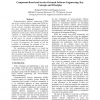128
click to vote
INTERACTIONS
2010
15 years 15 days ago
2010
s on Human Factors in Computing Systems. CHI ‘07. New York: ACM, 2007. university environment at scale, with structure, and with rigor. The notion of studio culture and learning ...
117
click to vote
IJVR
2008
15 years 2 months ago
2008
Evolutionary computation is a generic term used to make reference to the solution of computational problems planned and implemented based on models of an evolutionary process. Most...
105
click to vote
HICSS
1997
IEEE
15 years 6 months ago
1997
IEEE
Variousproposals have been madefor new paradigms for operating the restructuring electrical system. One of the key challenges associated with this restructuring is to effectively ...
158
click to vote
FTDCS
1997
IEEE
15 years 6 months ago
1997
IEEE
This paper identifies two paradigms that influence the design of telematics systems nowadays: the protocol-centred and the object-centred paradigm. Both paradigms have been intr...
117
click to vote
VLDB
2001
ACM
15 years 6 months ago
2001
ACM
This paper presents several paradigms by which users of Verity business portals (from within as well as from outside an enterprise) discover and navigate relevant semistructured d...
127
click to vote
UML
2001
Springer
15 years 6 months ago
2001
Springer
Modern distributed software applications generally operate in complex and heterogeneous computing environments (like the World Wide Web). Different paradigms (client-server, mobili...
128
click to vote
IEEESCC
2005
IEEE
15 years 7 months ago
2005
IEEE
Two practical paradigms are presented, which facilitate domain concepts to be directly used to model business operations: the first paradigm is based on the business artifacts and...
134
click to vote
EUROMICRO
2007
IEEE
15 years 8 months ago
2007
IEEE
Component-based software engineering (CBSE) and service-oriented software engineering (SOSE) are two of the most dominant engineering paradigms in current software community and i...



